Circles in the crops and sky-high geometry
For the second of Cider Days, ![[personal profile]](https://www.dreamwidth.org/img/silk/identity/user.png) spatch drove me and
spatch drove me and ![[personal profile]](https://www.dreamwidth.org/img/silk/identity/user.png) rushthatspeaks out to the Pioneer Valley where we visited an orchard, a used book store, and a purveyor of delicious barbecue. We had originally planned to visit his father as well, but illness in the family intervened. I had barely slept thanks to unmanaged pain thanks to the delinquent state of American healthcare and left my camera at home, but had nonetheless a wonderful time.
rushthatspeaks out to the Pioneer Valley where we visited an orchard, a used book store, and a purveyor of delicious barbecue. We had originally planned to visit his father as well, but illness in the family intervened. I had barely slept thanks to unmanaged pain thanks to the delinquent state of American healthcare and left my camera at home, but had nonetheless a wonderful time.
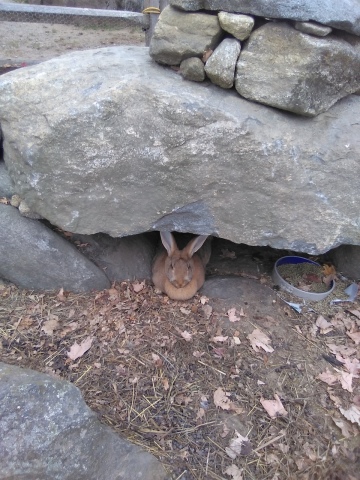
The orchard belonged to Red Apple Farm, off Route 2 in Phillipston. Pre-pandemic, Rob and I had been accustomed to order cider donuts from their outpost in the Boston Public Market, but we had never had them in situ, nor had we realized that in addition to acres of apple trees, the farm also had chickens, rabbits, goats, pigs, and a pair of donkeys who looked folksily lackadaisical until a small child approached with a cup of feed, at which point they became laser-guided. A lean roan goat hung out on the other side of the fence from me and occasionally cast reproachful glances at my hands which were only holding a cup of hot cider. The rabbits watched everyone come and go.
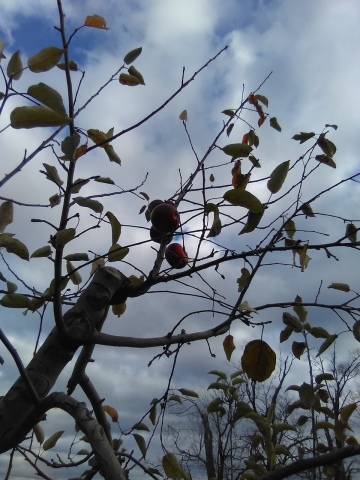
The first thing we did on arrival was order cider donuts, followed in short order by hot cider. Both were autumnally delicious and welcome in the scudding afternoon light. The Cidery offered seasonal flights of hard cider, the accordion should not have been miked for the dimensions of the Brew Barn, and I wandered off among the small, tangled apple trees before we left, which smelled like woodsmoke from the pizza concession with its open, snapping fire beside which patrons were playing cornhole.
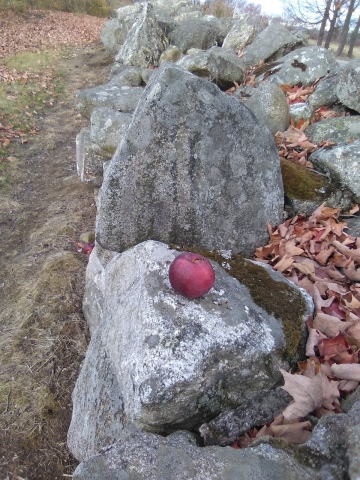
I had promised to yell at the first dry stone wall I saw in the Pioneer Valley for Wendell Corey and the dry stone wall at Red Apple Farm was the first one I saw. The apple was in position when I got there.
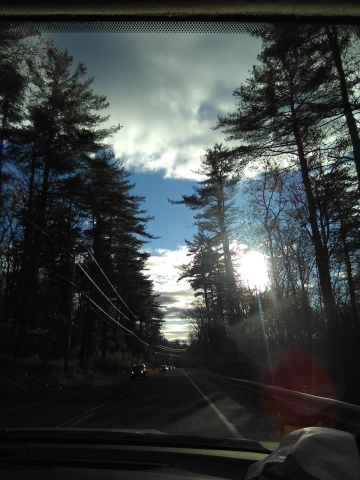
I was informed that the drowned towns of the Quabbin cannot be dived for, but we caught one glimpse of the reservoir between mountains on Route 202, faster than I could have snapped without warning, tranquilly glinting, the lowland hundred of western Mass. I must acknowledge for posterity that the sign for Athol occasioned all the normal jokes, including John Forster.
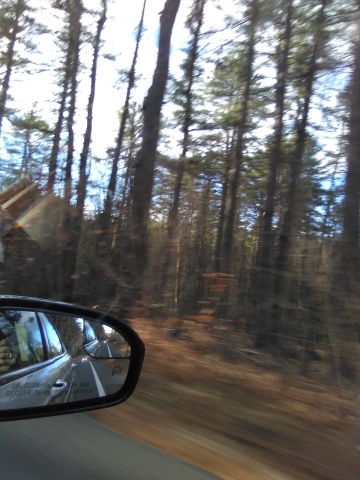
Because we were no longer meeting in-laws, we had the time for Rob to give us the driving tour of his childhood in Shutesbury, with a college-aged addendum in Amherst. He built up a neighborhood forty years gone from pointing out houses: his own, nestled far enough off the road that we couldn't tell whether the barn was still there; the one that had belonged to a richer family, who ran the Scout troop and had an Intellivision. For no good reason except the sheep his family had farmed for five or six years—Southdowns and Rambouillets—I had imagined his side of the mountain windier, more like moorland. It was packed full of trees and thin twisting roads and, at least along the routes we took, a majority of signs for Harris–Walz.

An unending source of delight during this trip were the DJs of WMUA, specifically of the Goth and dark wave show Xenocyx, spelled out for the listener, and its successor triplebackflip.fm, whose hosts described their remit as "chill."
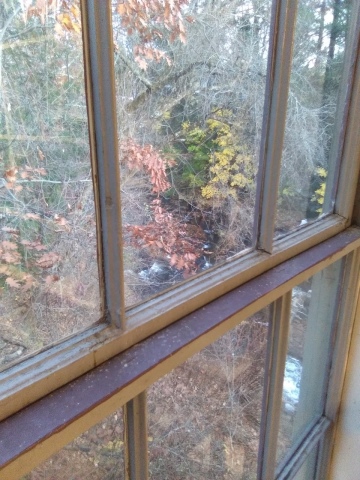
I have been in used book stores as dreamlike and addictive as the Montague Bookmill, but not for five years and none of them was a former grist mill whose slanted ceilings and planked floors were crammed with beautifully conditioned, often first editions of arts and academia while the sound of the Sawmill River still raced underneath its windows. A steep niche of the stairs was decorated with manual typewriters. We were close to its closing time, so could not settle in for the afternoon its bare-beamed airiness and density of stock invited, but I pounced on the first American edition of Terence Rattigan's Ross (1960) because it felt like a consolation prize for lacking the teleporter to see this double bill and Simon Armitage and Glyn Maxwell's Moon Country: Further Reports from Iceland (1996) because it had an appealing cover of black sand and blue ice and I liked one of the authors and knew nothing about the other and had read Auden and MacNeice's Letters from Iceland (1937) in whose footsteps they were consciously following and Ellen Klages' The Green Glass Sea (2006) because I had wanted it for some time as a present for my niece. I reluctantly left J. B. Priestley's The Prince of Pleasure and his Regency (1969) on grounds of, ironically, expense and it was just as well because I had just enough cash in all of my pockets to pay for my actual haul, including the fourteen dollars I counted out in singles about ten seconds before the owner called time. My husbands met me outside and we headed for dinner.
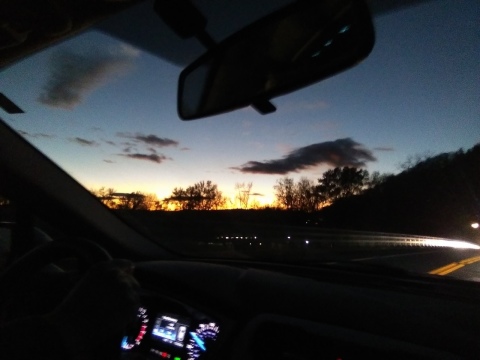
Once the light went, my phone was effectively useless as a camera, but we saw a superb, scratchily black-and-gold sunset over Sugarloaf, the individual trees like matchsticks against the flame.

The destination for dinner had always been Bub's Barbecue, which presented an unreassuring appearance on arrival, its parking lot so deserted and its enclosed porch so dark that while Rob and Rush-That-Speaks researched fallback options I went around to the side to see if its neon sign had been left on by mistake and was greeted by the counterperson, who asked me what I wanted. Not only did she turn on the lights so that we could eat on the porch, which felt closer to the unavailable-after-dark outdoor seating than the restaurant itself, eventually she ripped down the Halloween decorations of caution tape which had blocked out the windows and returned from a later foray carrying a pumpkin. None of us ordered the fried gator listed under seafood on the chalkboard of the menu, but we had a feast of brisket and baby back ribs and collards and fried green tomatoes and whipped sweet potatoes and mac and cheese and Rush-That-Speaks shared illuminating to ridiculous highlights of rock history from the podcast to which he is currently listening after the overhead music turned to the Beach Boys. We drove home listening to college radio until it ran out in the crackle of distance as opposed to the staticky reception of the mountains, a free-floating four-way two a.m. discussion at half past eight at night that intermittently remembered to play tracks like El Michels Affair's "Shimmy Shimmy Ya" (2009). The nightmare described by the one DJ in which everything had become triangles was genuinely Junji Ito. I watched the constellations thin out as we were resorbed into the light-haze of Boston.
So I had sunlight and cider and stone walls and new books and both of my husbands and a long day, but a good one despite the body I had to have it in. The clocks change tonight. I have a theory of sleep.

The orchard belonged to Red Apple Farm, off Route 2 in Phillipston. Pre-pandemic, Rob and I had been accustomed to order cider donuts from their outpost in the Boston Public Market, but we had never had them in situ, nor had we realized that in addition to acres of apple trees, the farm also had chickens, rabbits, goats, pigs, and a pair of donkeys who looked folksily lackadaisical until a small child approached with a cup of feed, at which point they became laser-guided. A lean roan goat hung out on the other side of the fence from me and occasionally cast reproachful glances at my hands which were only holding a cup of hot cider. The rabbits watched everyone come and go.

The first thing we did on arrival was order cider donuts, followed in short order by hot cider. Both were autumnally delicious and welcome in the scudding afternoon light. The Cidery offered seasonal flights of hard cider, the accordion should not have been miked for the dimensions of the Brew Barn, and I wandered off among the small, tangled apple trees before we left, which smelled like woodsmoke from the pizza concession with its open, snapping fire beside which patrons were playing cornhole.

I had promised to yell at the first dry stone wall I saw in the Pioneer Valley for Wendell Corey and the dry stone wall at Red Apple Farm was the first one I saw. The apple was in position when I got there.

I was informed that the drowned towns of the Quabbin cannot be dived for, but we caught one glimpse of the reservoir between mountains on Route 202, faster than I could have snapped without warning, tranquilly glinting, the lowland hundred of western Mass. I must acknowledge for posterity that the sign for Athol occasioned all the normal jokes, including John Forster.

Because we were no longer meeting in-laws, we had the time for Rob to give us the driving tour of his childhood in Shutesbury, with a college-aged addendum in Amherst. He built up a neighborhood forty years gone from pointing out houses: his own, nestled far enough off the road that we couldn't tell whether the barn was still there; the one that had belonged to a richer family, who ran the Scout troop and had an Intellivision. For no good reason except the sheep his family had farmed for five or six years—Southdowns and Rambouillets—I had imagined his side of the mountain windier, more like moorland. It was packed full of trees and thin twisting roads and, at least along the routes we took, a majority of signs for Harris–Walz.

An unending source of delight during this trip were the DJs of WMUA, specifically of the Goth and dark wave show Xenocyx, spelled out for the listener, and its successor triplebackflip.fm, whose hosts described their remit as "chill."

I have been in used book stores as dreamlike and addictive as the Montague Bookmill, but not for five years and none of them was a former grist mill whose slanted ceilings and planked floors were crammed with beautifully conditioned, often first editions of arts and academia while the sound of the Sawmill River still raced underneath its windows. A steep niche of the stairs was decorated with manual typewriters. We were close to its closing time, so could not settle in for the afternoon its bare-beamed airiness and density of stock invited, but I pounced on the first American edition of Terence Rattigan's Ross (1960) because it felt like a consolation prize for lacking the teleporter to see this double bill and Simon Armitage and Glyn Maxwell's Moon Country: Further Reports from Iceland (1996) because it had an appealing cover of black sand and blue ice and I liked one of the authors and knew nothing about the other and had read Auden and MacNeice's Letters from Iceland (1937) in whose footsteps they were consciously following and Ellen Klages' The Green Glass Sea (2006) because I had wanted it for some time as a present for my niece. I reluctantly left J. B. Priestley's The Prince of Pleasure and his Regency (1969) on grounds of, ironically, expense and it was just as well because I had just enough cash in all of my pockets to pay for my actual haul, including the fourteen dollars I counted out in singles about ten seconds before the owner called time. My husbands met me outside and we headed for dinner.

Once the light went, my phone was effectively useless as a camera, but we saw a superb, scratchily black-and-gold sunset over Sugarloaf, the individual trees like matchsticks against the flame.

The destination for dinner had always been Bub's Barbecue, which presented an unreassuring appearance on arrival, its parking lot so deserted and its enclosed porch so dark that while Rob and Rush-That-Speaks researched fallback options I went around to the side to see if its neon sign had been left on by mistake and was greeted by the counterperson, who asked me what I wanted. Not only did she turn on the lights so that we could eat on the porch, which felt closer to the unavailable-after-dark outdoor seating than the restaurant itself, eventually she ripped down the Halloween decorations of caution tape which had blocked out the windows and returned from a later foray carrying a pumpkin. None of us ordered the fried gator listed under seafood on the chalkboard of the menu, but we had a feast of brisket and baby back ribs and collards and fried green tomatoes and whipped sweet potatoes and mac and cheese and Rush-That-Speaks shared illuminating to ridiculous highlights of rock history from the podcast to which he is currently listening after the overhead music turned to the Beach Boys. We drove home listening to college radio until it ran out in the crackle of distance as opposed to the staticky reception of the mountains, a free-floating four-way two a.m. discussion at half past eight at night that intermittently remembered to play tracks like El Michels Affair's "Shimmy Shimmy Ya" (2009). The nightmare described by the one DJ in which everything had become triangles was genuinely Junji Ito. I watched the constellations thin out as we were resorbed into the light-haze of Boston.
So I had sunlight and cider and stone walls and new books and both of my husbands and a long day, but a good one despite the body I had to have it in. The clocks change tonight. I have a theory of sleep.

no subject
Was the hot cider alcoholic? Either way, I'd like to try that. (I've seen recipes for lambswool where you can use cider instead of ale; I mean to drink that before spring.)
I wonder who left that apple. Is it a New England tradition to shout at dry stone walls?
*So I had sunlight and cider and stone walls and new books and both of my husbands and a long day, but a good one despite the body I had to have it in.* Huzzah for all of this. I hope the changing clocks were kind to you.
no subject
Thank you!
Was the hot cider alcoholic? Either way, I'd like to try that. (I've seen recipes for lambswool where you can use cider instead of ale; I mean to drink that before spring.)
The hot cider was the non-alcoholic kind normal to New England—unsweetened, unfiltered, if you leave it alone in your refrigerator it will begin to ferment on its own and it used to be you could leave it over the winter and periodically scrape off the ice and have applejack in the spring—but there was an entire bar of the other kind of cider, which is much of the occasion of Cider Days. There was a whole string of participating orchards, we just visited the one. I would love to be able to introduce you to the apple trees of New England.
I wonder who left that apple. Is it a New England tradition to shout at dry stone walls?
Not as far as I know! It evolved idiosyncratically in my case over the last year of Wendell Corey's yarhzeit and birthday. It wouldn't have been the dry stone wall he built as a teen in the Springfield area if that 1950 interview can be believed, but it was the first one I saw, which fulfilled the conditions.
Huzzah for all of this. I hope the changing clocks were kind to you.
*hugs*
They were. I slept.